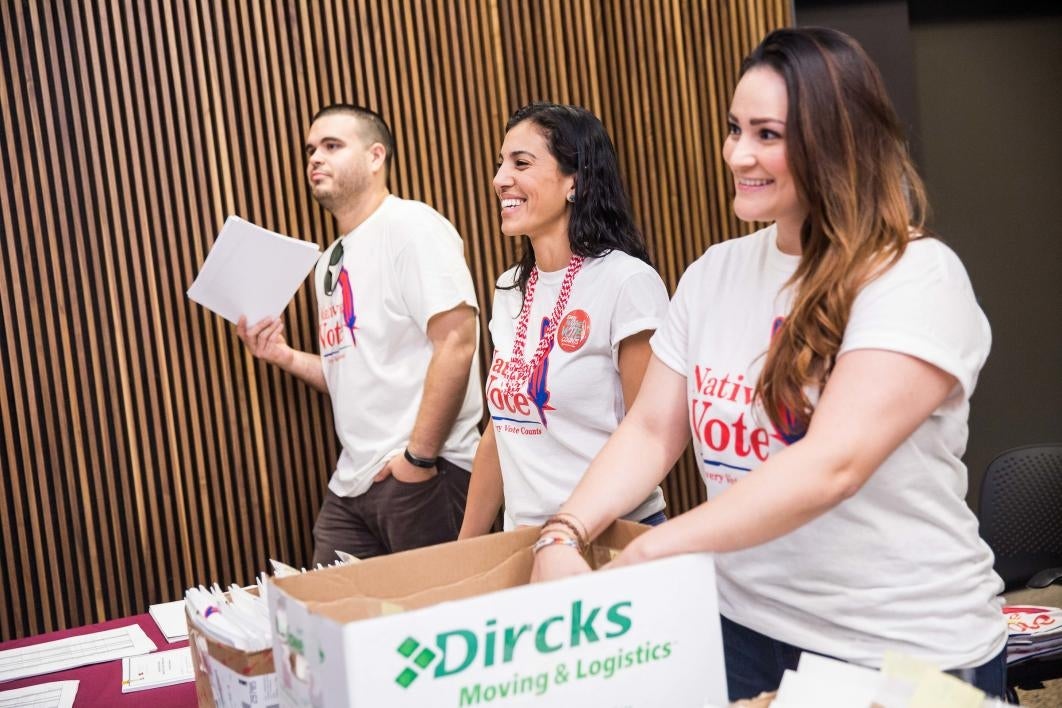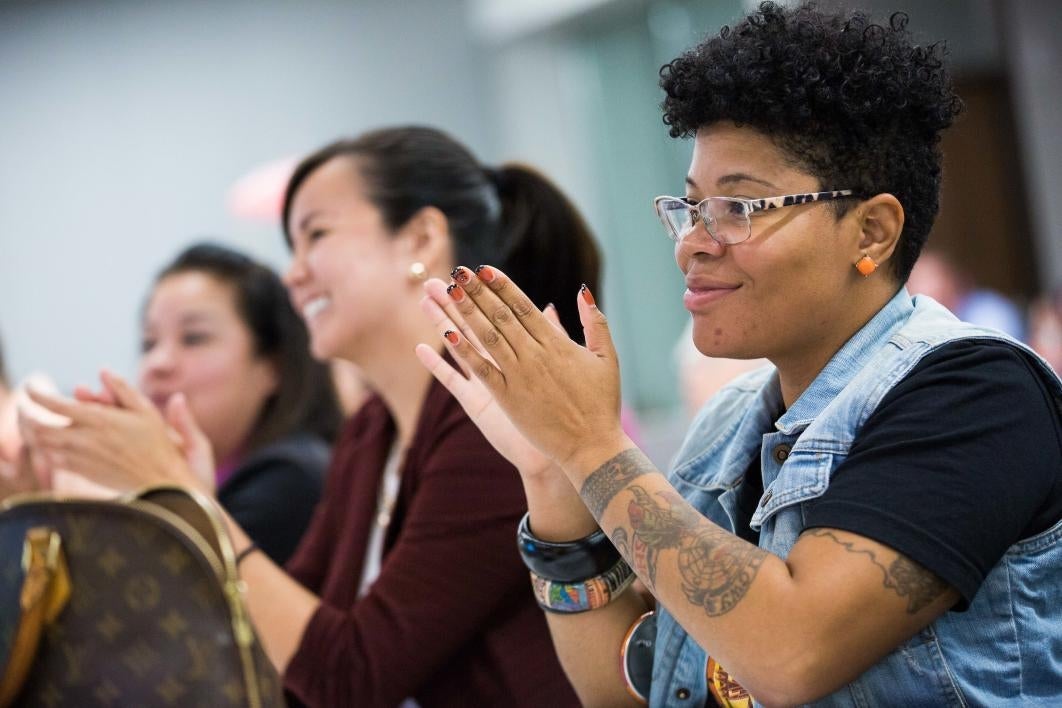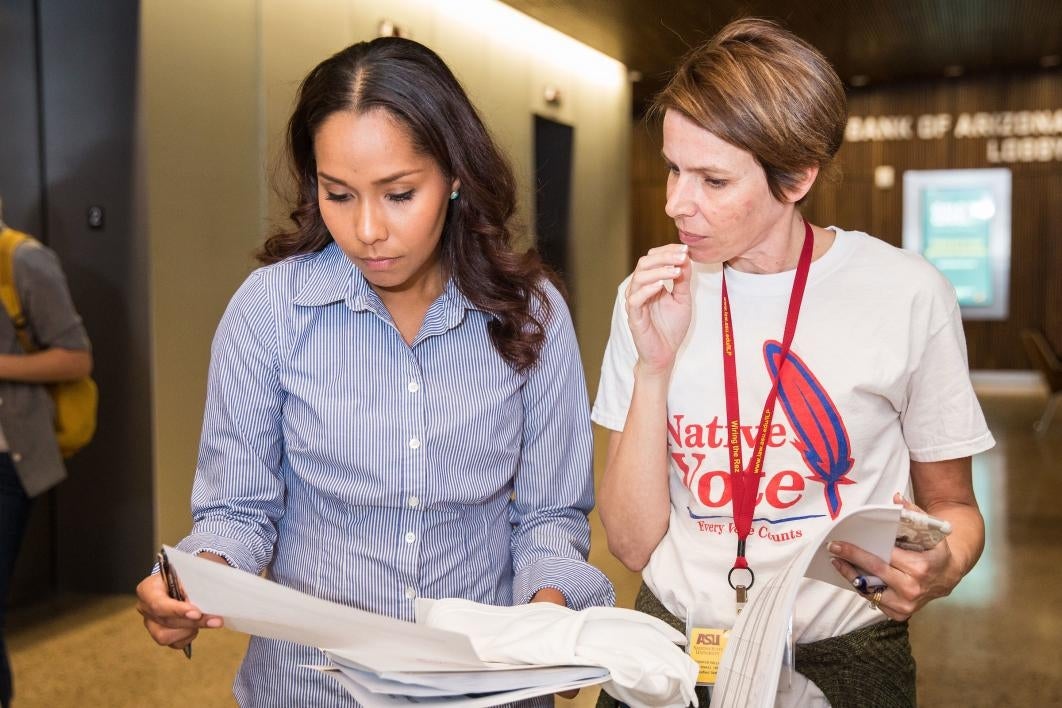ASU Law student Allyson Von Seggern said she felt like a rookie two years ago working a primary election.
She had recently moved from small-town Nebraska to the Phoenix area for law school. Eager to earn extra credit, she signed on to help with an ASU Indian Legal Clinic voter initiative. But she had no idea what to expect: “It was one of the most painful days of my life,” she said.
Today, thanks in part to hundreds of hours of experience with the clinic, she’s ready to lead a group of about 80 volunteers for the clinic’s Native Vote Election Protection Project, an outreach effort that helps American Indians navigate problems on Election Day.
“We’re out to make every vote count,” Von Seggern said.
Composed of ASU students and dozens of community members, the initiative aims to ensure that Native Americans exercise their right to vote in federal and state elections. The volunteers have been trained to be ready to help with a range of issues, including voter intimidation.
ASU Law professor Patty Ferguson-Bonhee runs the Indian Legal Clinic in the Sandra Day O’Connor College of Law, located at the Downtown Phoenix campus. She started Native Vote in response to a 2004 Arizona voter ID law.
Ferguson-Bonhee said that particular law and subsequent others don’t take into account the negative effects on Native Americans and that they often lead to canceled votes, confusion and disenfranchisement.
“Native Americans like to exercise their right to vote,” Ferguson-Bonhee said. “In the old days it was obvious why these laws were passed. These days the reasons are different, but it’s still the same result.”
Ferguson-Bonhee said Arizona has a bad track record regarding elections. According to her project’s website, Native Americans weren’t allowed to vote until 1948, when the Arizona Supreme Court overturned a long-standing ban on Indian voting. Natives continued to be excluded until 1970 through so-called literacy tests.
Since then, she said, many Native people in Arizona have continued to experience voting difficulties.
“It doesn’t seem like in this day and age there are people out there trying to prevent Native American from voting, but there are,” said Kris Beecher, a first-year law student who is enrolled in ASU’s Indian Legal Program.
Beecher, who is Navajo, worked in the 2014 election. He said he saw many Native voters get disqualified due to newly instituted laws and a lack of knowledge from poll workers. He also noticed something else.
“Many of the poll workers are not Native Americans, and they were on Native American soil and disqualifying potential voters,” he said.
The initiative includes volunteers dispersing to 12 polling sites around the state and others working a telephone hotline.
Kyra Climbingbear, a first-year law student from Piscataway, New Jersey, said she volunteered because “where I’m from, not many people vote.”
“Arizona has a large indigenous population, and they seem more unified here,” Climbingbear said. “They seem to understand that Native lives matter … you’re only as loud as your voice.”
Ferguson-Bonhee said Natives will face many issues on Election Day, which could include providing acceptable forms of identification, problems with confusing ballot language, being placed on a permanent early-voting list (which she said some counties do), being sent to incorrect polling locations, and legal and procedural differences between tribal and state elections.
“Once you secure a right, it’s great, but there’s roadblocks all around,” Ferguson-Bonhee said. “Our job on Election Day is to clear the roadblocks.”
Top photo: Director of the Legal Indian Clinic Patty Ferguson-Bohnee touches base with her students during an orientation for the Native Vote Initiative at ASU's Sandra Day O'Connor College of Law on Nov. 1. The initiative was organized by the Indian Legal Clinic and led by third-year ASU Law students. Photo by Deanna Dent/ASU Now
More Law, journalism and politics
Can elections results be counted quickly yet reliably?
Election results that are released as quickly as the public demands but are reliable enough to earn wide acceptance may not always be possible.At least that's what a bipartisan panel of elections…
Spring break trip to Hawaiʻi provides insight into Indigenous law
A group of Arizona State University law students spent a week in Hawaiʻi for spring break. And while they did take in some of the sites, sounds and tastes of the tropical destination, the trip…

LA journalists and officials gather to connect and salute fire coverage
Recognition of Los Angeles-area media coverage of the region’s January wildfires was the primary message as hundreds gathered at ASU California Center Broadway for an annual convening of journalists…





